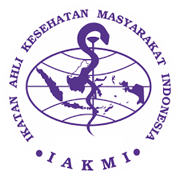FAKTOR-FAKTOR YANG BERHUBUNGAN DENGAN PENGGUNAAN METODE KONTRASEPSI JANGKA PANJANG (MKJP)
Abstract
One of the National Medium Term Development Plan 2015 – 2019 indicator is to increase active acceptors of long-term contraceptive method. In Cengkareng subdistrict community health centre, the proportion of long-term contraceptive method are low (4,6%). The purposed of this research is to analyzed the factors associated preference of long-term contraceptive method among women contraception acceptors in Cengkareng subdistrict community health centre. This research was an descriptive kuantitative with case control approach. The population were all women of contraception acceptors in Cengkareng subdistrict community health centre. The sample were 85 respondent for cases (total sampling) and 85 respondent for control (simple random sampling). This research used quisionaire instrument and analyzed used chi square test (α = 0,05). The result showed that variables which associated preference of long-term contraceptive method are educational level (sig = 0,001), knowledge (sig = 0,006), and support of spouse (sig = 0,005. As for age (sig = 0,177), number of children (sig = 0,490) and cost of contraception used (sig = 0,368). The suggestion for Cengkareng subdistrict community health centre are increase the service of give information for the citizen about long – term contraceptive method.
Â
Keywords : Long-term contraceptive method, Family planning, contraceptives
Â
Full Text:
PDF (Bahasa Indonesia)References
Badan Kependudukan dan Keluarga Berencana Nasional. (2011). Kebijakan Teknis Penanggulangan Masalah Kesehatan Reproduksi Melalui Program KB. Jakarta.
Badan Pusat Statistik. (2012). Survey Demografi dan Kesehatan Indonesia tahun 2012. Jakarta: BPS, BKKBN, Kemenkes, ICF International Kementerian Kesehatan Republik Indonesia. (2014). Pedoman Manajemen Pelayanan Keluarga Berencana. Jakarta : Kementerian Kesehatan.
Kementerian Kesehatan Republik Indonesia. (2016). Profil Kesehatan Indonesia 2016. Jakarta: Pusat Data dan Informasi 2016.
Mahmudah, Laras Tsany Nur., & Indrawati, Fitri. (2015). Analisis Faktor yang Berhubungan dengan Pemilihan Metode Kontrasepsi Jangka Panjang (MKJP) Pada Akseptor KB Wanita di Kecamatan Banyubiru Kabupaten Semarang. Unnes Journal of Public Health (2), 76 – 85
Maryani, Sri., Desmarnita, Ulty., & Djuwitaningsih, Sri. (2013). Dukungan Suami Dalam Pemilihan Metode Kontrasepsi Jankga Panjang. Jurnal Keperawatan Poltekkes Kemenkes Jakarta III, Vol. 1, No. 1, 49 – 56
National Health Service. How Effevtive is Contraception at Preventing Pregnancy?. https://www.nhs.uk/conditions/contraception/how-effective-contraception. diakses tanggal 7 Maret 2018.
Nislawaty. (2015). Hubungan Pengetahuan, Pendidikan, dan Status Ekonomi dengan Pemakaian Metode Kontrasepsi Jangka Panjang (MKJP) di Desa Ganting Damai Wilayah Kerja Puskesmas Salo Tahun 2015. Jurnal Kebidanan STIKes Tuanku Tambusai Riau, 47 – 60
Notoatmodjo, Soekidjo . (2005). Pengantar pendidikan kesehatan dan ilmu perilaku. Yogyakarta: Andi Jogja
Sinclair, Constance. (2009). Buku Saku Kebidanan. Jakarta: EGC
Suku Dinas Kesehatan Kota Administrasi Jakarta Barat. (2016). Profil Kesehatan Puskesmas Kecamatan Cengkareng Tahun 2016. Suku Dinas Kesehatan Jakarta Barat
DOI: https://doi.org/10.47007/hp.v1i01.3271
Refbacks
- There are currently no refbacks.
Copyright (c) 2020 Health Publica
Lembaga Penerbitan Universitas Esa Unggul
Jalan Arjuna Utara No 9 Kebon Jeruk Jakarta 11510
Telp : 021 5674223 ext 266
View My Stats


2.png)






